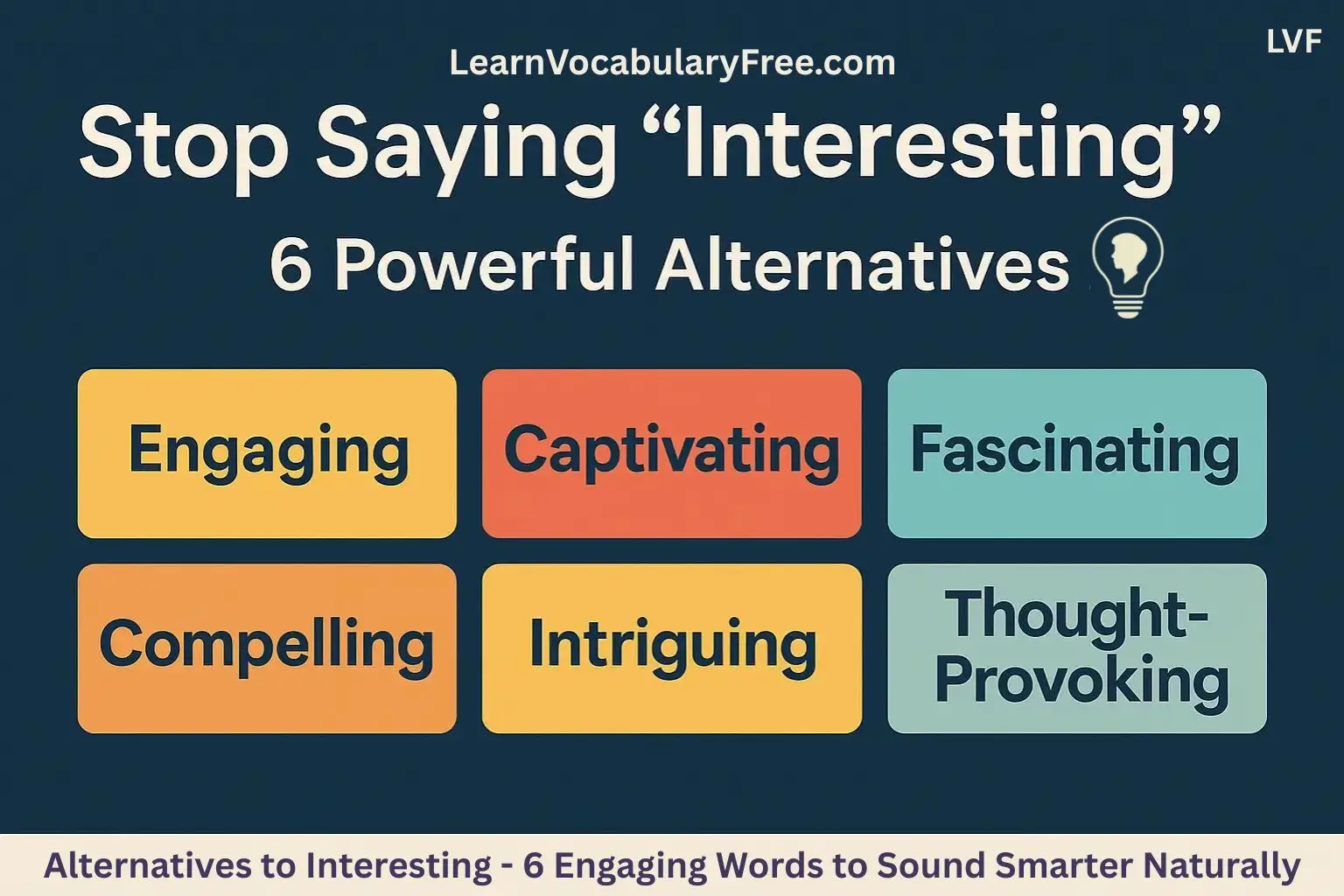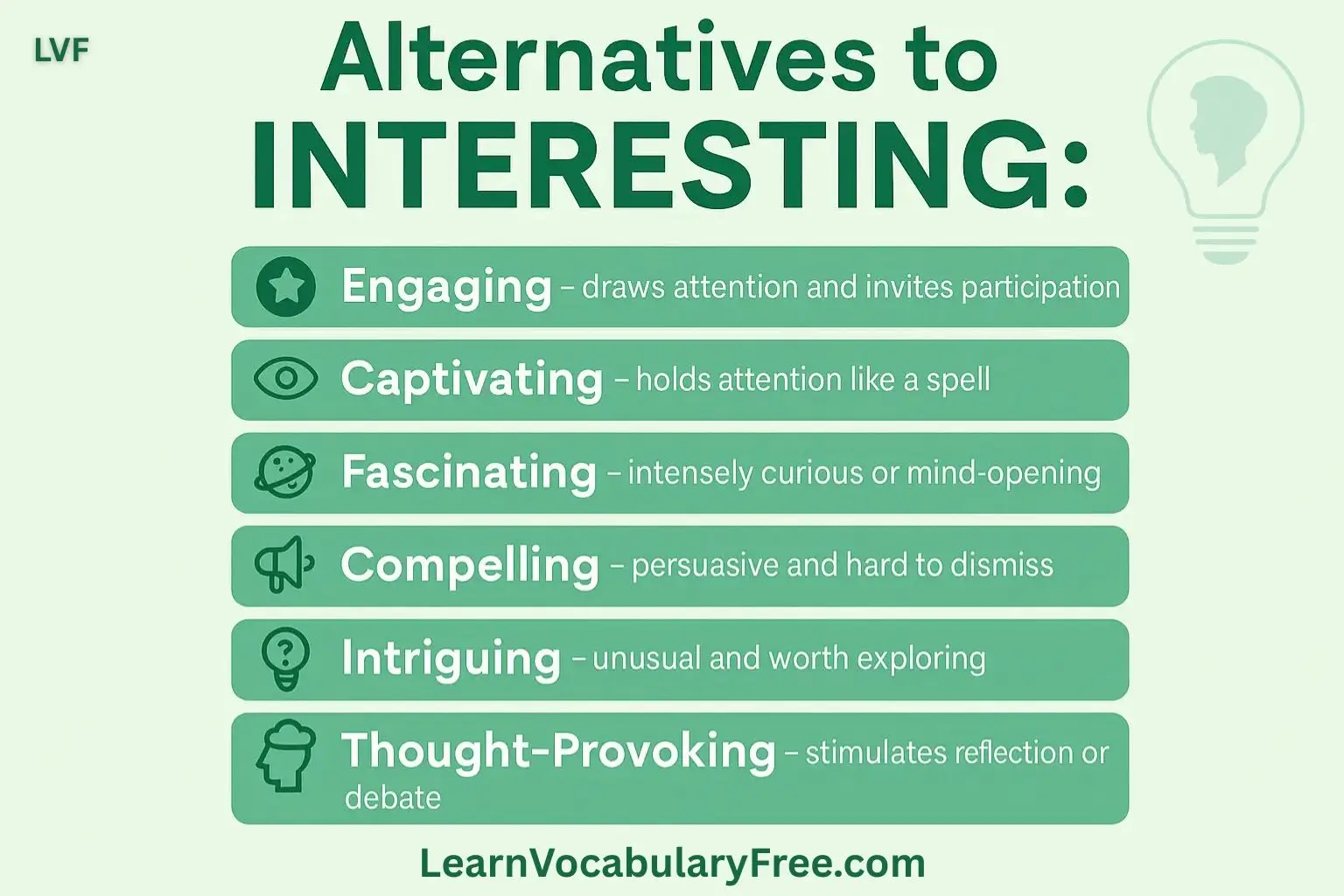Alternatives to Interesting: 6 Engaging Words to Sound Smarter Naturally
Looking for Alternatives to Interesting you can use in everyday English? Here are six precise choices—with usage notes and examples—to help you sound clear, confident, and smart.

Why Replace “Interesting” (and Use Engaging Alternatives)
“Interesting” is vague. It doesn’t tell your reader how or why something matters. These engaging alternatives to interesting add clarity, tone, and intent—ideal for emails, essays, reports, and presentations.
What “Interesting” Fails to Do (Clarity, Tone, and Evidence)
It’s under-specific
Readers can’t tell if you mean surprising, persuasive, or deeply insightful.
It weakens impact
Specific adjectives signal intent—helping your ideas land and stick.
It hides your stance
Use alternatives that reveal whether something is compelling, intriguing, or thought-provoking.
6 Engaging Alternatives to Interesting (With Usage Notes)
Engaging — draws attention and invites participation
- Use for content that keeps people involved or responsive.
- Great for lessons, talks, meetings, and UX.
Example: “Her workshop was engaging—everyone asked questions.”
Captivating — holds attention like a spell
- Best for stories, visuals, or performances.
- Stronger emotion than “engaging.”
Example: “The documentary was captivating from start to finish.”
Fascinating — intensely curious or mind-opening
- Use when information itself sparks curiosity.
- Good for science, history, analysis.
Example: “Her research on sleep cycles is genuinely fascinating.”
Compelling — persuasive and hard to dismiss
- Use with arguments, evidence, or calls to action.
- Pairs well with data and outcomes.
Example: “They presented a compelling case for investment.”
Intriguing — unusual and worth exploring
- Use for hints, mysteries, or unexpected angles.
- Good in intros and teasers.
Example: “The initial findings are intriguing—let’s dig deeper.”
Thought-Provoking — stimulates reflection or debate
- Use when ideas challenge assumptions or invite discussion.
- Ideal for opinion pieces and reviews.
Example: “Her essay on AI ethics is truly thought-provoking.”

How to Choose the Best Alternative (Keep Tone & Evidence Clear)
Match intent
Persuasion? Choose compelling. Curiosity? Choose intriguing or fascinating.
Mind audience & register
Engaging is safe/formal; captivating is expressive; thought-provoking is reflective.
Support with proof
Pair your adjective with a reason, result, or example for credibility.
Helpful Resources (Internal & External)
📘 LVF SAT High-Frequency Words
Build a precise vocabulary bank—curated words with examples and usage.
🧠 Communication & Expression Words (SAT Set)
Essential synonyms to refine tone—perfect for essays and presentations.
📖 “Interesting” — Cambridge Dictionary (Definition)
Check meanings, examples, and pronunciation to choose the right nuance.
🔎 “Interesting” — Merriam-Webster Thesaurus (Synonyms)
Explore near-synonyms and related terms to diversify your expression.
Conclusion: Use Precise, Engaging Alternatives to Interesting
Swap “interesting” for targeted adjectives—engaging, captivating, fascinating, compelling, intriguing, and thought-provoking—and your writing becomes clearer, stronger, and more persuasive.
Try it now: revise one paragraph and replace every “interesting” with a specific alternative + proof.
